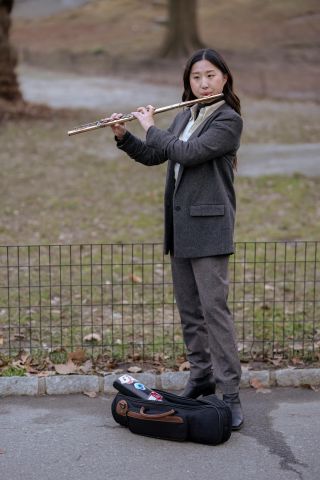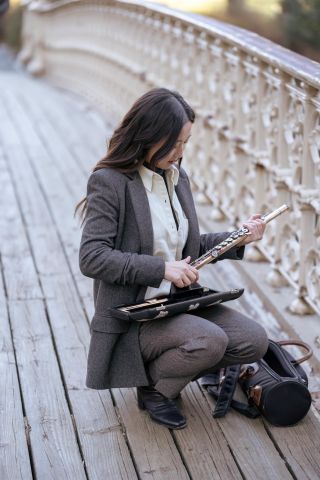
Girl playing flute in public.
Source: Pexels/CharlesParker
As a college professor, I am required to hold an office hour before my lecture. These office hours are optional and tend to be busier at the beginning and end of a semester. In the middle, they can become quiet. A few years, ago I was given a flute as a gift, so I decided that I would use my quiet office hour to practice this new instrument. The experience brought unexpected insights into performance anxiety.
I held my office hour in the near-empty lecture hall, one hour before the class began. The hall was open to any student who wished to talk with me about coursework or to take a seat and quietly read before the lecture began. I would assemble my flute, open my lesson book, and begin working on an instrument I had never played before. I also followed online video lessons — all done in front of a few students who would come early to class.
I would begin playing long tones, closing my eyes and “forgetting” that anyone was in the room with me. I was surprised to find that I felt no anxiety or self-consciousness while learning a new instrument in front of others. Had I been playing my main instrument, I would have had more concern about the level of my playing and how my playing was being received. However, in this setting, it was clear that I was an absolute beginner with no expectations of impressing anyone with my mastery.
In time, the audience grew to a regular group of about 15 students. The student’s reception was warm and enthusiastic. Some students expressed an interest in learning an instrument themselves. Over the course of the semester, I came to learn all major scales and the chromatic scale. I would regularly improvise with backing tracks played over the excellent sound system in the lecture hall. In effect, I was performing in a recital hall to a small audience.
This experience brought several things to my attention about performance anxiety. Firstly, the total absence of anxiety had little to do with my ability. I was a complete beginner on the instrument and was there to learn, not to perform. Although I was performing in front of an audience, my focus was not on impressing them with my abilities. My attention was set on figuring the instrument out. Just trying to make a tone and hold it (playing a long tone) as beautifully as possible took my entire engrossment. I had no expectations of how I would sound and had little expectations of sounding like anything more than a beginner. This allowed the audience to receive a performance that was not intended to impress them but was an observation of someone truly serving the instrument.
This audience did not pay an admission fee nor were they required to attend. They came, and some regularly attended, simply for the joy of watching someone learn to play. My position was one of complete vulnerability and a desire to learn the basics of the instrument.

Girl assembling a flute in a park.
Source: Pexels/CharlesParker
Since then, practicing in public has become a regular part of my weekly routine. Choosing a suitable and appropriate public space is important. Playing subtly and quietly is also helpful. Finding a piano in a hotel lobby or sitting in the park with a flute is ideal. Often people will stop and listen. Most people walk and do not seem to notice. Occasionally someone nervously approaches me and drops a few dollars in the open music case. It is striking to observe that at the moment they are more anxious approaching me than I am playing in front of them.
There have been many things I have learned from my experiment of learning an instrument in public. I did not expect to find so many insights about the role of my expectations, my intentions, and my reasons for playing to come to my attention. When a musician talks with me about their stage fright, I offer them this story and encourage them to go to the park and learn a new instrument.
